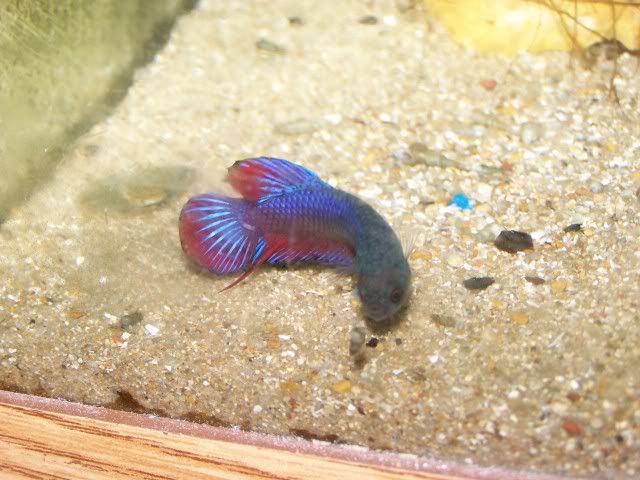
Wouldn’t it be nice if our bettas could talk to us and simply tell us that something was wrong?
A silly thought of course. Although not through the use of vocabulary, our bettas do communicate to us when something is wrong. It is up to us, the betta owners, to pay close attention to the habits and routines of our little finned friends. We need to look them over, study them closely, so that we are able to recognize their way of telling us that something is just not right. Being able to identify strange behavior or a difference in appearance is step number one in prevention.
- The following list contains “abnormal” betta behavior that will alert you to a potential problem.
- Scratching against tank decorations or gravel.
- Normally active but now moving slowly or not at all.
- Floating upside down or swimming sideways.
- Floating to the top or struggling to rise up from the bottom.
- Appearance of being bloated.
- Refusing to eat.
- Visible damage to fins, eyes, or scales.
- Spots or patches you have never seen before.
- Hanging around the heater or light for warmth all day.
- Fins continually clamped shut.
If you notice any of these problems the first thing to do would be to check the conditions of the water. The water should always be the first suspect. Check your Ph, ammonia, nitrites, all of it. You may even choose to perform a 100% water change. It is amazing what a dose of clean fresh water can achieve at times.
Ok, all testing and water changes have been performed but your betta is still displaying any of the above listed behaviors. You can now safely rule out the water. So, what do you do now?
This is where your looking closely over your bettas each day now comes into play. You have his normal appearance memorized. Now, you must look for signs, traces of any and all differences. This list will serve as helpful reference to recognizing symptoms related to illnesses. This should steer you in the right direction in finding a correct diagnosis in order that you can then find the proper medication to begin treatment.
- Symptom: Inflamed, torn, ragged, or disintegrating fins.
Illness: Fin Rot - Symptom: White growths on the body that are fluffy in appearance. These growths can also be found on the fin area.
Illness: Fungus - Symptom: Abnormal swimming pattern or loss of balance.
Illness: Swim Bladder Disorder - Symptom: Poor appetite, swollen stomach region, inactivity.
Illness: Constipation - Symptom: Inflamed eyes protruding from their sockets. Often the eyes will form a haze that is white in color. Inflamed eye sockets are also common.
Illness: Pop Eye - Symptom: A golden velvet or gray colored coating on body or fin area. Your betta will look like it has been sprinkled with gold dust. Darting, flashing, scratching against tank decorations or gravel. Rapid breathing.
Illness: Velvet - Symptom: The appearance, on the body or fins, of small white spots that resemble little grains of salt. Darting, flashing, scratching against tank decorations or gravel.
Illness: Ich - Symptom: Swollen body, protruding scales, bloated eyes.
Illness: Dropsy
This list consists of the most common illnesses that may be affecting your betta. I am in hopes that this guideline will be a help to you in identifying the disease and finding the correct medication to begin treatment.
When medication is required, be sure to follow all of the instructions on the package. Resist any urge to add extra medication for “good measure.” There are reasons why the manufacturers put specific directions and dosage amounts. More is not always better.
Also, never mix medications unless it is specifically stated that it is safe to do so. When in doubt, don’t do it. If your betta is suffering from any of the above mentioned illnesses he has enough problems. Over medicating will only add to his stress and possibly prove to be fatal.
On a final note. Make sure you follow through with medicating for the entire suggested time of treatment. Don’t stop medicating simply because your betta begins to look and act healthy again. Stopping in midstream may bring on relapse. Just as we humans need to complete a prescription for illness even though we are feeling better, the same applies to your betta.
Check your water temperature! We had a betta given to us by my brother when he moved away. It was a great little fish and very happy. After a few months, it seemed sick. It lost its beautiful color, wouldn’t eat, and hid at the bottom of the tank most of the time. We couldn’t figure it out. We tried so many things and even looked online for answers. After about a month of “illness”, our sweet little fish died. We bought a new one who was very active at first, but after only a week he was acting the same way our first fish did. We didn’t know what to do. We even prayed for our little fish. Finally the thought came that I should check the water temperature. I read online that it should be in the mid to high 70s F. When I used a thermometer to check our tank, I was saddened to see that it was only 68 degrees F, the room temperature of our home. Our little friend was freezing! We hadn’t thought about how the cold winter months would affect the fish. I immediately put warmer water into the tank and ordered a new heater for it. Our little betta is now a very happy and active fish once again. We were heartbroken when we realized that we could have saved our first fish if only we had known about the temperature. Please don’t make the same mistake we did. Check your water temperature now…before it is too late!